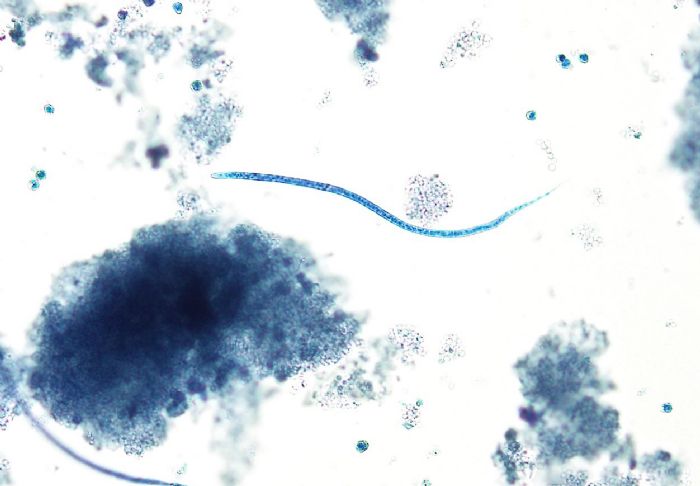Research UPDATES
Sub-links for this page
- Effectiveness of aspirin vs. clopidogrel
- Canine Cancer Project
- 1st complete GSD DNA - new disease fighting tool
RESEARCH UPDATES
Investigating drug resistance in Australian canine heartworm infections
Rose Power and Jan Slapeta
Sydney School of Veterinary Science
University of Sydney
Canine heartworm disease is a deadly cardiopulmonary disease caused by the parasite Dirofilaria immitis (1). This parasite affects dogs in Australia each year and is spread by mosquito vectors (1, 2). Canine heartworm is currently endemic in Australia, with high infection rates occurring in Queensland (1, 3). A recent case of canine heartworm infection also occurred in Sydney (The University of Sydney) in 2020 when adult heartworms were obtained from the heart of a dog (2). To prevent heartworm infections, veterinarians and pet owners mainly use the macrocyclic lactone class of drugs. These drugs are administered orally or topically each month, or via yearly injections (1). However, lack of efficacy for these ML preventive drugs have been increasingly reported in the USA, and resistant heartworm isolates have been confirmed (4, 5). Similarly, research in Australia has reported the development of canine heartworm disease in dogs despite alleged rigorous compliance with the administration of preventive drugs (1). This finding poses an important question of whether drug resistance is also present in Australia. The potential emergence of drug resistance in Australian heartworms is a major concern for the veterinary industry as it would limit the effectiveness of current preventives and hence jeopardise dog health and wellbeing.
 In the Veterinary Parasitology Laboratory at The University of Sydney, we are investigating the drug resistance status of the Australian canine heartworm population. The work was initiated with funds from the Canine Research Foundation. To do this, we utilise a variety of techniques and tools. Our lab receives blood samples from heartworm-infected dogs residing in Queensland, with a few dogs occasionally from New South Wales. We perform the microfilaria suppression test on blood samples collected before and after drug administration to determine the drug’s success at clearing circulating microfilariae. Antigen testing is also performed to screen for circulating heartworm antigens in infected dogs. The microfilariae are then filtered from the blood and used for genetic testing. Five single nucleotide polymorphisms (SNPs) have been previously associated with drug resistance in heartworms from the USA. By adopting this 5-SNP predictive model, we aim to determine whether resistant alleles are present in microfilaria populations in Australia. We employ this 5-SNP approach to perform both pyrosequencing and Illumina amplicon next generation sequencing of our microfilaria samples.
In the Veterinary Parasitology Laboratory at The University of Sydney, we are investigating the drug resistance status of the Australian canine heartworm population. The work was initiated with funds from the Canine Research Foundation. To do this, we utilise a variety of techniques and tools. Our lab receives blood samples from heartworm-infected dogs residing in Queensland, with a few dogs occasionally from New South Wales. We perform the microfilaria suppression test on blood samples collected before and after drug administration to determine the drug’s success at clearing circulating microfilariae. Antigen testing is also performed to screen for circulating heartworm antigens in infected dogs. The microfilariae are then filtered from the blood and used for genetic testing. Five single nucleotide polymorphisms (SNPs) have been previously associated with drug resistance in heartworms from the USA. By adopting this 5-SNP predictive model, we aim to determine whether resistant alleles are present in microfilaria populations in Australia. We employ this 5-SNP approach to perform both pyrosequencing and Illumina amplicon next generation sequencing of our microfilaria samples.
Now the good news - by performing these genetic tests, we have so far not found any evidence of drug resistance in canine heartworms in Australia. Surveillance, however, is critical and the truth is that the question is not “if” but “when” makes the headlines read the ML-resistance in Australian canine heartworm. The team at the University of Sydney has the tools to survey and inform the veterinary profession.
References
1. Nguyen C, Koh WL, Casteriano A, Beijerink N, Godfrey C, Brown G, et al. Mosquito-borne heartworm Dirofilaria immitis in dogs from Australia. Parasit Vectors. 2016;9(1):535.
2. Lau DC-W, McLeod S, Collaery S, Peou S, Tran AT, Liang M, et al. Whole-genome reference of Dirofilaria immitis from Australia to determine single nucleotide polymorphisms associated with macrocyclic lactone resistance in the USA. Current Research in Parasitology & Vector-Borne Diseases. 2021;1:100007.
3. Orr B, Ma G, Koh WL, Malik R, Norris JM, Westman ME, et al. Pig-hunting dogs are an at-risk population for canine heartworm (Dirofilaria immitis) infection in eastern Australia. Parasit Vectors. 2020;13(1):69.
4. Hampshire VA. Evaluation of efficacy of heartworm preventive products at the FDA. Veterinary parasitology. 2005;133(2):191-5.
5. Pulaski CN, Malone JB, Bourguinat C, Prichard R, Geary T, Ward D, et al. Establishment of macrocyclic lactone resistant Dirofilaria immitis isolates in experimentally infected laboratory dogs. Parasites & vectors. 2014;7(1):494.
New vaccine hopes for dogs with cancer - Dr Christopher Weir (Kolling Institute)
Research supported by the Canine Research Foundation
New Cancer Vaccine for Dogs Offers Hope - Dr Christopher Weir (Kolling Institute)
Research supported by the Canine Research Foundation
READ more at:
https://www.australiandoglover.com/2019/09/new-canine-cancer-vaccine-offers-hope.html
Contact Details
Chair Sue Anderson Liaison Officer: A FullerSeaford, VIC, Australia
